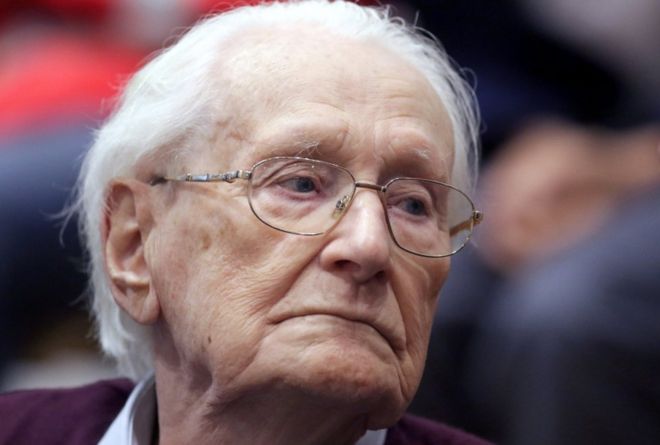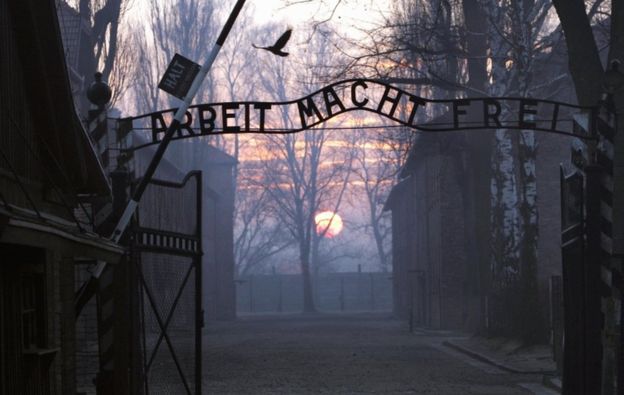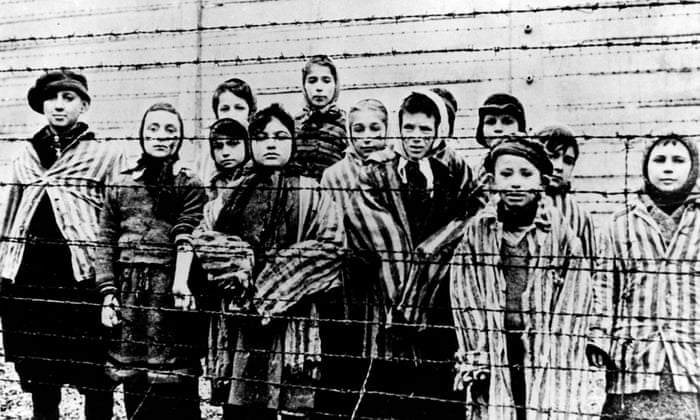Unforgotten, Eva Mozes Kor
"As we were holding on to my mother, a Nazi came running, yelling at us in German shouting 'Twins! Twins!' Another Nazi came over and pulled my mother to the right while the other one pulled me and my sister to the left."
"My mother started screaming and I remember her hand was still in the air and she was crying and I never even got to say goodbye to her. I didn't realize that would be the last time I would ever see her."
Eva Mozes Kor, Holocaust survivor, Mengele victim
 |
| Eva Kor poses at the CANDLES Holocaust Museum in Terre Haute, Ind., in 1999. (Bob Poynter/The Tribune-Star/AP) |
In 2015 Eva Mozes Kor was a witness in a German court where Oskar Groening, a former S.S. guard, the "bookkeeper of death" was on trial. He was convicted of complicity in the murder of 300,000 Jews. He pleaded that he had nothing to do with the organized killing of Jewish internees, but the court held that his complicity lay in the fact that he was a willing tool of the machinery of internment leading to mass extermination. As an accessory, required to keep the wheels of the machinery of death in motion, he was found guilty as charged.
 |
| The former Nazi guard said he felt "moral guilt" for his actions at Auschwitz - but never served a day of his sentence Reuters |
There were, besides Eva Mozes Kor -- to identify the man and validate his connection with the death camp -- another 49 former internees. When the jail sentence was brought down after the German man's conviction, Eva Mozes Kor made her objection to his punishment known. Leading the other witnesses to make it perfectly clear they did not share her sentiments. Eva Mozes Kor argued that Groening's sentence would have had a more useful application by forcing him to speak publicly of his experiences in an aid to countering claims of Holocaust deniers.
She herself, throughout the years following the end of World War II and her rehabilitation back to health and the future, dedicated herself to doing just that; public speaking where she gave talks, appeared in documentaries and wrote several books detailing her horrific experiences. She died at age 85, while leading one of many annual tours to Auschwitz. On July 4th, she breathed her last in Krakow, Poland.
Born at Port, Romania in 1934, she and her twin sister Miriam were deported along with their family -- parents and two older sisters -- from a regional ghetto, when they were shipped out to Auschwitz. The very night they were separated from their parents on arrival at the camp, with the memory of their mother's anguished agony at separation from her twin daughters, the girls, aged ten, were informed they were the only ones left in their family; the rest had perished in the gas chambers.
 |
| It is estimated that 1.1 million people, most of them European Jews, died at Auschwitz AFP/Getty Images |
And they were spared only so that they could serve as guinea pigs in the infamous Dr. Mengele's experimental laboratories with his focus on twins, subjecting them to horrendous research resulting in the death of most of the experimental subjects. Eva was frequently drained of blood in one diabolical experiment whose design was to establish how much blood loss a human could be subjected to without triggering death. She was regularly injected with chemicals.
Had one of the two girls died as a result of any of the experiments they were subjected to, the other would have been immediately killed with an injection to the heart to enable Mengele to carry out a "comparative autopsy". Eva founded Candles (Children of Auschwitz Nazi Deadly Lab Experiment Survivors) in 1984. She aided in setting up a Holocaust museum close to where she lived. In the early 1990s her work occasioned a cooling rift with other surviving Mengele twins when it became known she was prepared to forgive her transgressors.
She took this path in 1993 when she met Hans Munch who had been a physician at Auschwitz, a friend of Mengele. "I found out that he was a real human being and a very nice man. I really liked him and that was a very strange feeling. He said the nightmare he lived with every single day of his life was watching the people dying in the gas chambers.... I asked if he would go with me to Auschwitz in 1995 to sign a document saying what he did at the ruin of the gas chamber in the company of witnesses, and he said yes. Afterwards, I decided to give him a letter of forgiveness."
"Forgiveness", she later explained "has nothing to do with the perpetrator. Forgiveness has everything to do with the victim taking back their life. I don't have to deal with the whole issue of who did what to me -- and how on earth am I going to punish them and make them pay for it?"
In the final analysis, Eva Mozes Kor dedicated herself to ensuring that the horrors of the Holocaust were not forgotten, by establishing memorials, by speaking out often publicly and lending her experience to posterity. That she found it spiritually liberating to profess and feel forgiveness for the horrors inflicted upon her as a helpless child by a bestially brutal hatred-and-death cult was her decision to make.
She could not and would not make it on behalf of anyone else; not her anguished mother, her dead sisters, or the other 49 members of her extended family who all perished at the hands of rabidly inhumane ideologues who dedicated their resources to a well-calibrated and carried-out program of mass annihilation in the world's most ambitiously successful effort at genocide.
 |
| A group of children in the Auschwitz concentration camp in January 1945, just after liberation by the Soviet army. Photograph: AP |
Labels: Eva Mozes Kor, Holocaust, In Memoriam, Rest In Peace
0 Comments:
Post a Comment
<< Home